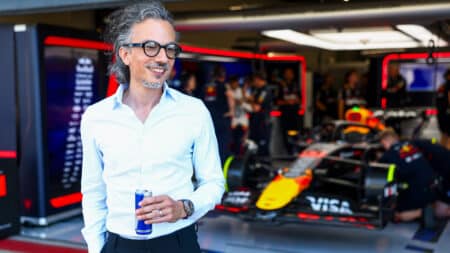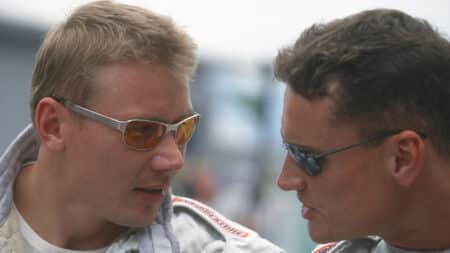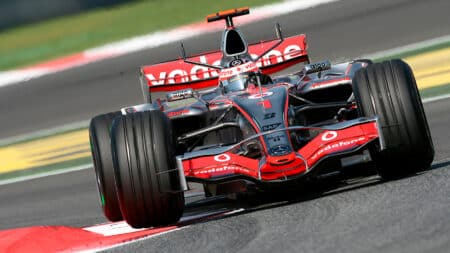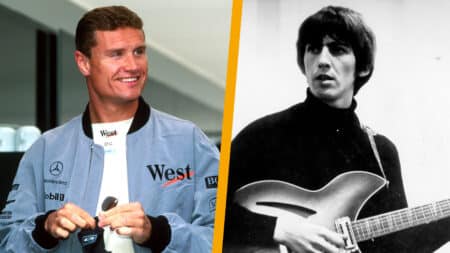
MPH: To the man trying to fill Christian Horner's shoes: good luck!
Laurent Mekies arrives as Red Bull F1 team principal with a series of immediate challenges to solve and long-term issues to tackle. He'll either sink or swim, says Mark Hughes
Mission Complete in the 2.40 at Chepstow: there could be no better name for AP McCoy’s 4000th winner. Destiny called.
Except that the seven-year-old gelding was withdrawn because the going was deemed too soft.
Domination in sport, apparently robust, is in fact fragile. Failure, so much easier to attain, can overtake you, trip and blind-side you at the drop of a clutch, catch or shot.
McCoy, who today (Thursday) might complete his mission at Lord Hesketh’s Towcester Racecourse, is the greatest National Hunt jockey. His victory tally stands almost 1500 proud of the next highest and he is on the verge of his 19th champion jockey title on the trot.
Such longevity and consistency do not sit comfortably with a bone-jarring/breaking sport that has at its heart an unspoken partnership with another sentient, willful and fallible species. No wonder multiple successive race victories are hard to come by in McCoy’s world.
It’s the same on the flat. Sir Gordon Richards’ 12 in October 1933 appears to be the best run, although a Puerto Rican stallion called Camarero reportedly won 56 straight between 1953 and ’55.
Individual sports, where you have only yourself to blame if self-motivation, self-reliance and your talent come up short, is a happier home for the sporting hot streak.
Ed Moses, uniquely grooved at 13 strides between the barriers, won 122 consecutive 400m hurdles between 1977 and ’87, while Michael Phelps had gone 10 years unbeaten in 200m butterfly finals by the time Bert le Clos’ “beautiful boy!” finger-pipped him to gold at London 2012.

Michael Phelps celebrates his eighth gold medal in during the 2004 Olympics. Photo by Bryan Allison
Despite the more obvious wear and tear of boxing, Julio César Chávez reached 87 and O before being held to a draw by Pernell Whitaker in 1993. Sugar Ray Robinson’s eight-year, 91-bout undefeated streak, including two draws, ended unexpectedly against Britain’s Randolph Turpin in 1951. And Welsh flyweight Jimmy Wilde, known as ‘The Ghost with the Hammer in his Hand’, won 103 in a row before Scotsman Tancy Lee floored him in 1915.
Racquet sports provide another rich seam for the dominant. Martina Navratilova prevailed in 74 consecutive singles matches in 1984. Helen Wills Moody, the tennis queen of the 1920s and ’30s, strung together at least 158 wins without conceding a set, and her predecessor, La Divine Suzanne Lenglen, successfully netted 182 between 1921 and ’26.
And then there’s squash, that most claustrophobic test of fitness and resolve. Pakistan’s Jahangir Khan squished 555 consecutive opponents in the first half of the 1980s, and yet Aussie Heather McKay, unbeaten during her 19 years as a professional, is likely to have squished even more.
The search for perfection in team sports, where the cliché holds that you are only as good as your weakest member, is a more complex task. Even Arsène Wenger’s Arsenal ‘Invincibles’ of 2003-’04 drew 12 of their 38 Premier League fixtures.
A draw being an alien concept to American sport, the Miami Dolphins of 1972 remains the only team to complete a perfect NFL season: 17 and O. And that same year, Wilt ‘The Stilt’ Chamberlain’s LA Lakers stretched its NBA record to 33 victories on the bounce.

Wilt Chamberlain (right) in 1966 during his time with the Philadelphia 76ers
An MLB baseball season is more convoluted, with 162 fixtures per team before the best-of-seven post-season play-offs and World Series, and just once since 1935 has a team won 20 games in a row: the Moneyball Oakland Athletics of 2002.
Formula 1
Although F1’s calendar is less crowded, it is no less demanding and, I would argue, possesses many more facets capable of sustaining error.
With one man at the apex of a huge team – some number more than 600 staff (plus those of its main suppliers) – and in ultimate control of a finely honed machine that incorporates many hundreds of mechanical, hydraulic and electrical parts constructed from a wide variety of materials and designed to survive at the precipitous edge of calamity, it’s little wonder that Sebastian Vettel’s current victory sequence has been bettered only once.
The German’s forthcoming opportunity, at Austin and Interlagos, to match Alberto Ascari’s 60-year-old achievement of winning nine consecutive Grands Prix will be the final act of interest of the current 2.4 V8 formula.
Ascari, like Vettel, was at his best when controlling matters from the front. Leaping from pole position, he was capable of sustaining a speed beyond the reach of even Juan Fangio.
The latter’s absence from much of 1952 because of a neck injury sustained in June’s non-championship Monza GP admittedly opened the field wide for Ascari, and the chubby Italian – nickname Ciccio – made hay by winning six world championship GPs in succession, five of them by huge margins. Only in Germany, when a late pit stop for oil forced him to hunt down unimpressed team-mate Giuseppe Farina, was his advantage (14 seconds) anything other than fundamental.
He started five of these races from pole, set fastest lap in all six, and led for a record 304 consecutive laps.
1953 was a tougher task. Not only did Fangio return, but the Argentinian’s much-delayed Maserati was much improved and more than a match for Ascari’s well-proven Ferrari in terms of acceleration and top speed, if not handling and braking.
The latter, however, won in Argentina (by a lap) and Holland – both from pole – and in Belgium (by almost three minutes) before his spell was broken at Reims. There the others finally sank their claws into him and it was left to his younger, more devil-may-care team-mate Mike Hawthorn to uphold Ferrari’s honour. Ascari finished fourth. Suddenly 4.6 seconds seemed gapingly huge.
Ascari proceeded to win in Britain – he would have won in Germany, too, but for an errant front wheel – and in Switzerland to secure back-to-back world titles.
The latter occasion saw him charge after a long stop for new spark plugs, and ignore team orders, to put Farina firmly in his place. There was fire in that belly. Yet when Ascari lost out in a last-corner scramble at Monza three weeks later, the label stuck: a bottler not a battler.
Though there was only a grain of truth to this harsh assessment, it has survived the sands of time.
Michael Schumacher, another supreme frontrunner whose career was besmirched by a few moments of weakness, won seven GPs in a row in 2004. Chances are that he is soon to be upstaged on this account – and eventually on all others – by his young compatriot.
Vettel set up for a record-breaking run
Vettel’s recent wins in Singapore, India and Abu Dhabi were Ascari-like in their completeness and it’s impossible to imagine anybody beating him in America and Brazil such is his and Red Bull’s momentum.
The real measure of the man, however, would be a 10th consecutive GP victory, in Melbourne next March: new formula, new slate – there’s no need to wipe the old one clean – and some different chalk with which to make his mark.
The question of Vettel’s greatness has been answered. The question now is: how great?
Should his run end at seven, eight or nine, however, it will remain an astounding achievement for all concerned. Championships can still be won despite the occasional cough, hiccup and Jean-Louis Schlesser. To win race after race after race is both a more difficult challenge and a better arbiter of skill and preparation because it happens so infrequently.
When McLaren prevailed in all but one GP of 1988, tech boss Gordon Murray’s toughest task was the fight against complacency. Schlesser’s clumsy bunting of an impetuous Ayrton Senna from the lead at Monza did not annoy Gordon as much as did the spark plug problem that had caused Alain Prost’s earlier retirement. Far from it.
Thus Tom Kristensen’s nine Le Mans 24 Hours successes, though a remarkable stat, is, for me, topped by the fact that six of them were achieved consecutively. Just think how many gentleman racers in slower machinery he had to overtake during this sequence. Then there are the gear changes, the infinitesimal pauses at TDC, the concentration and the trust in fellow co-drivers to consider. Staggering.
The ridiculously high demands of such faultless repetition are proved by the fact that nine-time world champion Sébastien Loeb and, lest we forget, the redoubtable Daniel Elena never won more than six WRC rounds in a row – although they might have made it 12 but for a cautious, title-clinching third place in Japan in 2008.
The equally remorseless AJ Foyt won the first seven rounds – five on pavement and two on dirt – of the 1964 Champ Car season: a record that still stands. And in NASCAR, motor racing’s baseball equivalent, nobody has won more than 10 in a row.
The latter, racked up by Richard Petty in 1967, is my favourite hot streak in motor sport because of its redolent ‘branch line’ sequence of venues: (stopping at) Bowman Gray, Columbia, Savannah, Darlington, Hickory, Richmond, Beltsville, Occoneechee, Martinsville and North Wilkesboro.
Winning is the most important thing if you want to be crowned a champion.
How and where you win matter only if you want to be called a king.

Laurent Mekies arrives as Red Bull F1 team principal with a series of immediate challenges to solve and long-term issues to tackle. He'll either sink or swim, says Mark Hughes

Former McLaren F1 team-mates Mika Häkkinen and David Coulthard are set to renew old rivalries in a new Evening with... tour – they told James Elson all about it

In Formula 1, driver contracts may look iron-clad on paper, but history shows that some of its biggest stars have made dramatic early exits

Former McLaren F1 ace told James Elson about his private audience with The Beatles' George Harrison, who played an unreleased grand prix-themed song